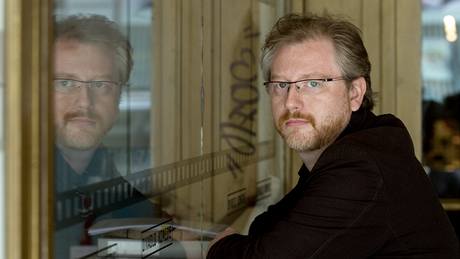about the production
The Komedie Theatre, which belongs to the most progressive Czech stages in the field of introducing Czech and German plays, is returning to Divadelná Nitra after two years. (They played here in 2009 and staged Kafka’s The Trial). Once again, with a dramatization of a prose, with an author who had been part of the Prague German-Jewish community. This time, it is not Franz Kafka but his less known fellow playwright Johannes Urzidil. This writer, partially connected with Slovakia as well (in the late 1930’s he collaborated with the Bratislava journal Forum), was a member of the Prague expressionist movement – in the café Arco he got to know Franz Werfel, Max Brod and many other representatives of Prague cultural life between the two world wars. Also Karel Weissenstein was a frequent visitor of Prague artistic cafés of the First Republic. This real life figure of the cultural environment of the day, congenial with the expressionists in particular, appears in several works of contemporary literature. A hydrocephalic, whose existence is only a set of temporary solutions, searching in vain for a frame tie and staggering through life. Johannes Urzidil is describing this strange figure in his approximately one-hundred-page prose. The text has been dramatized by David Jařab who staged the play as part of the exclusively German season in the Komedie Theatre.
The dramatization makes the story more intimate. We hear about several characters only in Weissenstein’s replicas. The story is compressed into several main dilemmas and turning points in the life of the main protagonist. Critics often appreciate actors‘ achievements, as representatives of Weissenstein’s character which is split into three parts: Jiří Černý, Martin Finger and Stanislav Majera offer three views of the world, but also three faces which this strange man is showing to the world. An almost childish simplicity, a charm and purity are contrasted with egocentrism and selfishness which are characteristic of the main protagonist. Urzidil’s Weissenstein is not a helpless man lynched by society for his alternative way of living.
His main problem is his inability to take responsibility for his own deeds. Although he indirectly causes the death of three people, he is not able to admit his share of guilt openly. As for ideas, the production Weissenstein offers that which is most typical and characteristic of Prague all over the world. It depicts the atmosphere of the capital of Czechoslovakia of those days where Czech-German Jews represented the cultural elite. From the theatre point of view, the production offers that which had made the Czech theatre different from other theatre cultures. It was the German rational perception of theatre art filled, however, with Slavonic emotions.
Miroslav Zwiefelhofer
“From Urzidil’s story David Jařab has dissected the most essential story line and some replicas. Those who are familiar with the one-hundred-page text must just curtsey when they see how cleverly Jařab has done it. How he has cut off everything “literary“ and set each used word functionally into the theatrical form. It has a form of a small stage simple story in which Karel Weissenstein is performed by three identically (and excellently!) made up actors. Maybe Jařab was prompted to do it by the protagonist’s remark that “I have sometimes had such spells when I was experiencing myself in double.”
Josef Chuchma, Mladá fronta dnes
“Karel Weissenstein is not a schizophrenic or a lunatic, he is only a wretch and a chicken-heart. To avoid facing things is one of his most pronounced life motifs. He avoids facing himself too, as is illustrated by one of his sentences towards the end of the play, which may also sound familiar to the viewer: ´All my life I have tried to be someone else, because I was lacking the courage to be myself.´”
Petra Hůlová, Divadelní noviny
“The director of the production Weissenstein David Jařab has principally reworked the text of the story: in a remarkable dramaturgical adaptation he has shortened the more than one-hundred-page story to a ninety-minute theatrical form..., transformed the extensive statement of the main protagonist Weissenstein into a powerful reduction.”
Věra Ptáčková, Divadelní noviny
creators
direction, set design, dramatisation: David Jařab
translation: Božena Koseková
music: Ivan Acher
singing live: Jana Šrajerová Vébrová
costumes: Kamila Polívková
characters and cast: Weissenstein: Jiří Černý, Martin Finger, Stanislav Majer, Vlasta: Dana Poláková, Filoména: Ivana Uhlířová
director

David Jařab (1971) studied direction at the Janáček Academy of Performing Arts in Brno, Czech Republic. From 1993 he was active at the experimental stage Hadivadlo in Brno, Czech Republic, as a director, author and finally artistic director. Later on, in Prague, he worked as a free lance lecturer, script writer, translator, TV and theatre director. From 2002, along with Dušan D. Pařízek, he became a leading personality in the Komedie Theatre as a director and home author. He is the author of more than 10 original and adapted theatre texts, 30 composed literary and drama evenings and full feature staged productions.
Lately: A Legend about a Drunkard, according to Joseph Roth’s story, Oil Lamps, according to the novel by Jaroslav Havlíček, The Sufferings of Prince Sternenhoch according to Ladislav Klíma and others. In addition to theatre direction and playwriting, he is active in visual art, stage setting and authored films. His full length feature film Vaterland – A Hunter’s Diary had its first run in 2004. Jařab was awarded the Prize of the Literary Fund for it as the best film in 2004 and the Prize of the Film Academy “The Czech Lion“ for visual art work in the Czech film in 2004.
